It looks like you're using an Ad Blocker.
Please white-list or disable AboveTopSecret.com in your ad-blocking tool.
Thank you.
Some features of ATS will be disabled while you continue to use an ad-blocker.
share:
This seems to be happening regularly now. Looking back 10 years we have:
2002: Larsen Ice Shelf collapses
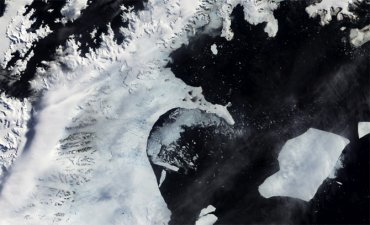
2005: B-15A iceberg
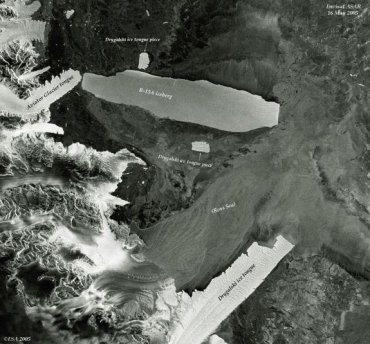
2007: An earlier Pine Glacier iceberg
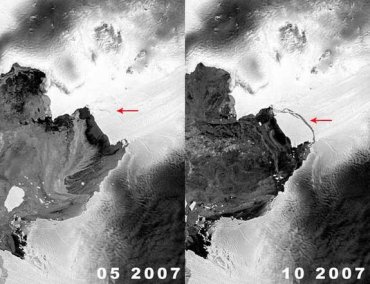
2010: iceberg B-09B crashes into Mertz Glacier creating a second iceberg
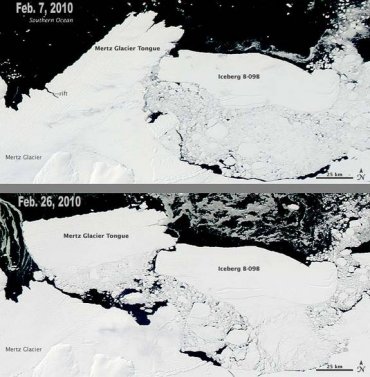
There are fluctuations year to year and even seasonal, but the trend is obvious with regards to the ice mass covering Antarctica:
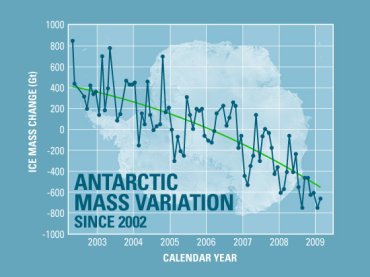
It doesn't really matter what you think or don't think is the cause. I don't buy it's all normal, move along (seems like a cop-out) and global warming may be wrong too. Whatever the reason:
www.livescience.com...
www.nasa.gov...
2002: Larsen Ice Shelf collapses

2005: B-15A iceberg

2007: An earlier Pine Glacier iceberg

2010: iceberg B-09B crashes into Mertz Glacier creating a second iceberg

There are fluctuations year to year and even seasonal, but the trend is obvious with regards to the ice mass covering Antarctica:

It doesn't really matter what you think or don't think is the cause. I don't buy it's all normal, move along (seems like a cop-out) and global warming may be wrong too. Whatever the reason:
The continent of Antarctica has been losing more than 100 cubic kilometers (24 cubic miles) of ice per year since 2002.
www.livescience.com...
www.nasa.gov...
edit on 1-2-2012 by Nicolas Flamel because: (no reason given)
I saw this last night, kept having images of an ice cube crumpling due to the excessive heat. Woke up really hot in the night, and this season has
been unnaturally warm, not to mention the Xflares and cme's.
I suspect there could be some flash floods and we need to keep an eye on this and envision how to escape rising waters if it were to occur suddenly.
I suspect there could be some flash floods and we need to keep an eye on this and envision how to escape rising waters if it were to occur suddenly.
reply to post by tetriswoooo
I think as it approaches a coastal region, the increasingly lower depth would stop it beforehand.
I think as it approaches a coastal region, the increasingly lower depth would stop it beforehand.
Originally posted by tetriswoooo
not trying to fear monger but is there any chance this could hit a land mass and cause damage/death???
An iceberg hitting land and killing people. Now I've heard it all...
I wish people would think about what they're about to type rather than posting rubbish.
But to answer your question, no. A huge iceberg travelling at < 1mph isn't going to hit land and catch anyone unaware.
edit on 1-2-2012 by
TrueInstinct because: (no reason given)
reply to post by TrueInstinct
Yeah the thing is as big as New York it would be visible at least thirty miles away giving you plenty of time to get off the beach.
Yeah the thing is as big as New York it would be visible at least thirty miles away giving you plenty of time to get off the beach.
reply to post by jjkenobi
Bravo...now get over here and help me clean the Coca-Cola off my monitor.
Run the Titanic into it!
Bravo...now get over here and help me clean the Coca-Cola off my monitor.
Originally posted by tarifa37
reply to post by boo1981
The implications could be huge.Once all the floating ice has broken free there would be nothing to stop the glacier from sliding into the sea and thus raising sea levels.
except that it's a piece of ice that's already in the water, thus, already contributing to the sea level and not affecting it after breaking off.
I need to ask a few things about this...
Does anyone know if its an actual iceberg, as in no land mass anywhere below that?
if it is an iceberg any budding scientists able to work out an approx depth it would be sitting at...
from rough figures by measuring it by eye what we talking here a 190 square mile black of ice not taking into account the mass of caused by the depth of the ice surley this would take a sunami like force to get it shifting accross the ocean before it could just float a few miles over a few years as it slowly melts??
Just curious!
Does anyone know if its an actual iceberg, as in no land mass anywhere below that?
if it is an iceberg any budding scientists able to work out an approx depth it would be sitting at...
from rough figures by measuring it by eye what we talking here a 190 square mile black of ice not taking into account the mass of caused by the depth of the ice surley this would take a sunami like force to get it shifting accross the ocean before it could just float a few miles over a few years as it slowly melts??
Just curious!
reply to post by boo1981
So maybe this is nothing to be alarmed about. Did we see any effects from B9B? And so far from the iceberg the size of Dorset....nothing. UNLESS, these icebergs are melting so much quicker because their mass is more exposed to warm water, thus diluting the salt ratio in the oceans and causing some of the mass dolphin/whale beachings! Huh? Huhhhhh? Think about it.
Ok so this happened in 2010.
An iceberg the size of Dorset has broken off from Antarctica and could disrupt weather patterns for years to come.
The iceberg, which measures 50 miles by 25 miles, snapped off the Mertz Glacier, a 100-mile long tongue of ice earlier this month.
It was dislodged by an older, 60-mile-long iceberg called B9B, which broke off the glacier in 1987.
So maybe this is nothing to be alarmed about. Did we see any effects from B9B? And so far from the iceberg the size of Dorset....nothing. UNLESS, these icebergs are melting so much quicker because their mass is more exposed to warm water, thus diluting the salt ratio in the oceans and causing some of the mass dolphin/whale beachings! Huh? Huhhhhh? Think about it.
An iceberg the size of New York makes it sound like a pretty big chunk of ice. But, really, New York is 6720 square miles. The ocean covers 139
million square miles of the Earth's surface, in comparison. And that is not even taking into account the massive depths of the world's oceans.
This is a drop of water, globally speaking, and will just be swallowed up.
This is a drop of water, globally speaking, and will just be swallowed up.
Might be a good time to start buying flood insurance.
If you live in a coastal region that is.
If you live in a coastal region that is.
Clearly we are seeing an acceleration of large icebergs breaking away from Antarctica.
These ice shelves are what is keeping the glaciers on land from sliding into the oceans. How much of this is being created by glaciers on the continent sliding towards the ocean.
The Southern Ocean around Antarctica is warming, and the speed of the Antarctic Circumpolar Current is accelerating, and moving towards the continent.
None of the climate models I have seen take into account this acceleration of Global Warming. They keep saying we won't see serious consequences for a hundred years, but we are already seeing serious problems developing, and may see major impacts within this decade, or the next few decades.
These ice shelves are what is keeping the glaciers on land from sliding into the oceans. How much of this is being created by glaciers on the continent sliding towards the ocean.
The Southern Ocean around Antarctica is warming, and the speed of the Antarctic Circumpolar Current is accelerating, and moving towards the continent.
None of the climate models I have seen take into account this acceleration of Global Warming. They keep saying we won't see serious consequences for a hundred years, but we are already seeing serious problems developing, and may see major impacts within this decade, or the next few decades.
reply to post by coffeesniffer
Yes, it is normal. It's sometimes referred to as calving. It's caused by interactions between sea water melting the outer layers of ice, and frictional and tidal forces. This calf is just happens to be extraordinarily large.
Yes, it is normal. It's sometimes referred to as calving. It's caused by interactions between sea water melting the outer layers of ice, and frictional and tidal forces. This calf is just happens to be extraordinarily large.
reply to post by GonzoSinister
The ice sheet is 165 feet tall, and it's area is about 300 square miles. A block of ice with those dimensions would have a volume of about 39 cubic kilometers (about 9 cubic miles). This is the volume of ice, which is slightly larger than the volume of liquid water due to differences in density. I just had a long day of class, so I don't really feel like calculating the volume of liquid water that ice sheet would hold. The difference shouldn't be too significant. For comparison, the total volume of the world's oceans is over 1 billion cubic kilometers (200 million cubic miles). The volume of water produced by this ice berg probably won't cause a tsunami, but it may affect local weather patterns.
The ice sheet is 165 feet tall, and it's area is about 300 square miles. A block of ice with those dimensions would have a volume of about 39 cubic kilometers (about 9 cubic miles). This is the volume of ice, which is slightly larger than the volume of liquid water due to differences in density. I just had a long day of class, so I don't really feel like calculating the volume of liquid water that ice sheet would hold. The difference shouldn't be too significant. For comparison, the total volume of the world's oceans is over 1 billion cubic kilometers (200 million cubic miles). The volume of water produced by this ice berg probably won't cause a tsunami, but it may affect local weather patterns.
I see absolutely no evidence this is from man caused global warming ice sheets have been breaking away from Antarctica for the last 3 million years
and the climate has been fluctuating for the last 3 million years.
We have only had the satellites to view these breakup for about 30 years. before that little was known about the Antarctic..
We have only had the satellites to view these breakup for about 30 years. before that little was known about the Antarctic..
All I know is man began controlling the weather
when he started rounding up
Groundhogs and putting them in Zoo's.
when he started rounding up
Groundhogs and putting them in Zoo's.
I hope there won't be any polar bears that get stranded on it and taken out to sea to starve/drown to death. ETA: Nevermind, it's in Antarctica
I like that guys idea of towing it to Africa to provide drinking water. It reminds me of that Futurama episode where to combat global warming, they'd get a big chunk of ice, and dump it in the water each year.
I like that guys idea of towing it to Africa to provide drinking water. It reminds me of that Futurama episode where to combat global warming, they'd get a big chunk of ice, and dump it in the water each year.
edit on 1-2-2012 by TupacShakur because: (no reason given)
There have been some huge ones out of the greenland ice sheet too...last year, one so big it blocked the sea betwwen two islands fo some time...
definately loosing our cool, but, to what end?
Surely the world has been there done that once or twice now in the billions of years its been here....fear not....
definately loosing our cool, but, to what end?
Surely the world has been there done that once or twice now in the billions of years its been here....fear not....
new topics
-
BIDEN Admin Begins Planning For January 2025 Transition to a New President - Today is 4.26.2024.
2024 Elections: 1 hours ago -
Big Storms
Fragile Earth: 2 hours ago -
Where should Trump hold his next rally
2024 Elections: 5 hours ago -
Shocking Number of Voters are Open to Committing Election Fraud
US Political Madness: 6 hours ago -
Gov Kristi Noem Shot and Killed "Less Than Worthless Dog" and a 'Smelly Goat
2024 Elections: 7 hours ago -
Falkville Robot-Man
Aliens and UFOs: 7 hours ago -
James O’Keefe: I have evidence that exposes the CIA, and it’s on camera.
Whistle Blowers and Leaked Documents: 7 hours ago -
Australian PM says the quiet part out loud - "free speech is a threat to democratic dicourse"...?!
New World Order: 8 hours ago -
Ireland VS Globalists
Social Issues and Civil Unrest: 9 hours ago -
Biden "Happy To Debate Trump"
2024 Elections: 9 hours ago
top topics
-
James O’Keefe: I have evidence that exposes the CIA, and it’s on camera.
Whistle Blowers and Leaked Documents: 7 hours ago, 14 flags -
Australian PM says the quiet part out loud - "free speech is a threat to democratic dicourse"...?!
New World Order: 8 hours ago, 13 flags -
Blast from the past: ATS Review Podcast, 2006: With All Three Amigos
Member PODcasts: 12 hours ago, 13 flags -
Biden "Happy To Debate Trump"
2024 Elections: 9 hours ago, 12 flags -
Mike Pinder The Moody Blues R.I.P.
Music: 12 hours ago, 8 flags -
What is the white pill?
Philosophy and Metaphysics: 11 hours ago, 6 flags -
Shocking Number of Voters are Open to Committing Election Fraud
US Political Madness: 6 hours ago, 6 flags -
RAAF airbase in Roswell, New Mexico is on fire
Aliens and UFOs: 9 hours ago, 5 flags -
Ireland VS Globalists
Social Issues and Civil Unrest: 9 hours ago, 5 flags -
Where should Trump hold his next rally
2024 Elections: 5 hours ago, 5 flags
active topics
-
Gov Kristi Noem Shot and Killed "Less Than Worthless Dog" and a 'Smelly Goat
2024 Elections • 45 • : cherokeetroy -
Where should Trump hold his next rally
2024 Elections • 20 • : WannabeeAuCourant -
RAAF airbase in Roswell, New Mexico is on fire
Aliens and UFOs • 9 • : Degradation33 -
President BIDEN's FBI Raided Donald Trump's Florida Home for OBAMA-NORTH KOREA Documents.
Political Conspiracies • 38 • : SchrodingersRat -
Big Storms
Fragile Earth • 11 • : GENERAL EYES -
BIDEN Admin Begins Planning For January 2025 Transition to a New President - Today is 4.26.2024.
2024 Elections • 7 • : WannabeeAuCourant -
Joe Biden and Donald Trump are both traitors
2024 Elections • 65 • : MrMez -
Mood Music Part VI
Music • 3112 • : underpass61 -
James O’Keefe: I have evidence that exposes the CIA, and it’s on camera.
Whistle Blowers and Leaked Documents • 12 • : pianopraze -
Australian PM says the quiet part out loud - "free speech is a threat to democratic dicourse"...?!
New World Order • 6 • : Scratchpost

